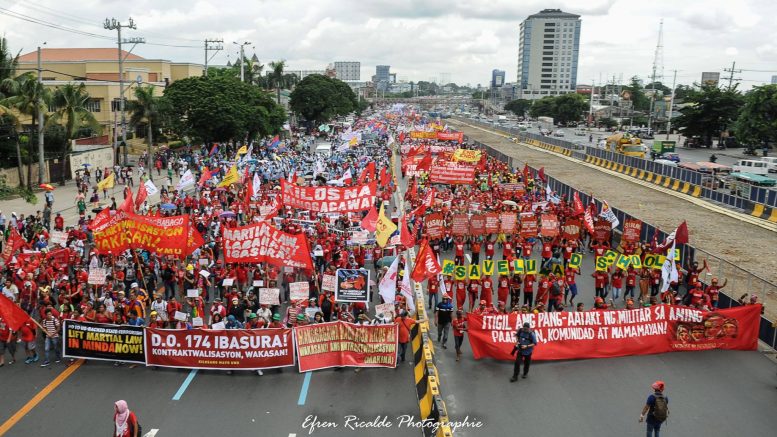A labor nongovernment organization expresses dismay over President Rodrigo Duterte’s lack of concrete actions to effectively address legitimate demands of the workers one year after he took office.
On the day of the his second State of the Nation Address, the Ecumenical Institute for Labor Education and Research (EILER) said that President Duterte has failed to break away from imperialist rule and be different from previous regimes. Critical labor issues remain unresolved as he neglects to fulfill his promise of meaningful change including socio-economic reforms for the workers.
“His militarist and violent approach has further intensified attacks to workers’ democratic rights and worsened labor conditions in the country,” EILER Executive Director Rochelle Porras said. “To be truly different as he claims to be, President Duterte must end decades of implementing neoliberal policies and reconsider the militarization of his cabinet. He must stop the war on drugs and lift martial law.”
The labor NGO said that the 10-point Socioeconomic Agenda, Philippine Development Plan 2017-2022, and AmBisyon Natin 2040 adopted by President Duterte maintain the anti-worker policies of previous administrations. The plans would further engulf the economy to debt and cheapen labor cost in the country at the expense of workers’ wages and job security. EILER also criticized the ambitious “Build, Build, Build” infrastructure development plan, noting that it will prioritize around Php8 trillion worth of spending, guaranteeing super profits, over the allocated budget for education estimated at Php3.3 trillion in President Duterte’s six-year term (average of Php544.1 billion annually).
“In his last year’s SONA, the President vowed to prioritize job creation and regularization of workers,” Porras recalled. “Soon after, the Duterte administration and his economic managers flaunted a long list of foreign-funded, multi-billion-peso infrastructure projects marketed to address unemployment. However, that would only serve big local and foreign players while Filipino workers remain miserable with no bargaining rights.”
According to EILER, the administration’s promise of job creation is yet to be seen, as joblessness remains high at 11.5 million and the overall quality of work continues to decline. Widespread contractualization, land grabbing, and lack of decent jobs forced Filipinos to leave their families and work abroad. An estimated 6,092 Filipinos leave the country daily, mostly women, who are vulnerable to exploitation, discrimination, and other gender-specific assaults. Poverty and the increase of unemployment in the country are bolstered by labor flexibilization schemes that further press down wages. The highest minimum wage of P481 in Metro Manila does not meet the P1,092 living wage for a family of five.
“With implementation of DOLE DO 174, labor situation is worsened allowing companies to still practice contractualization and violate workers’ job security,” Porras said. “In addition, President Duterte’s new plan on rehashing the two-tier wage system is far from the workers’ demand of a national minimum wage. While the cost of living rises, workers continue to receive meager wages in their workplace and at home, they face threats of violent demolitions and harassment of communities in the name of war on drugs and martial law.”
“We urge the president to uphold the democratic interests of the Filipino workers and stop the killings and violence. He should lift martial law and take concrete steps in the pursuit of just and lasting peace.” Porras concluded.

